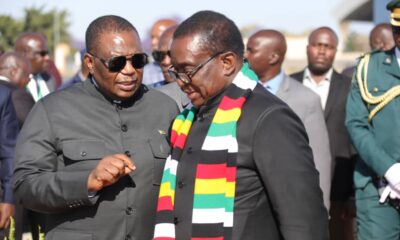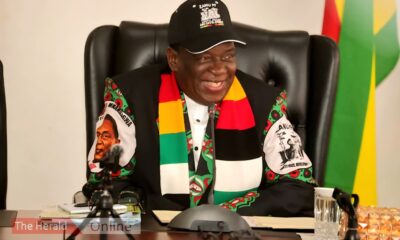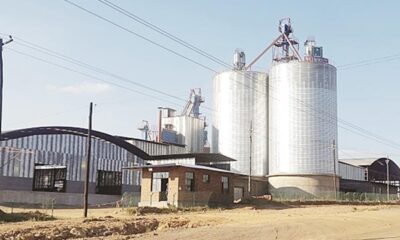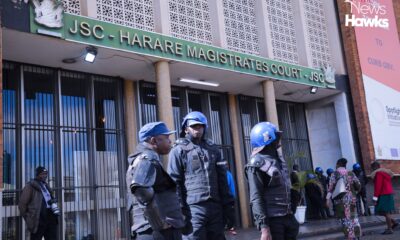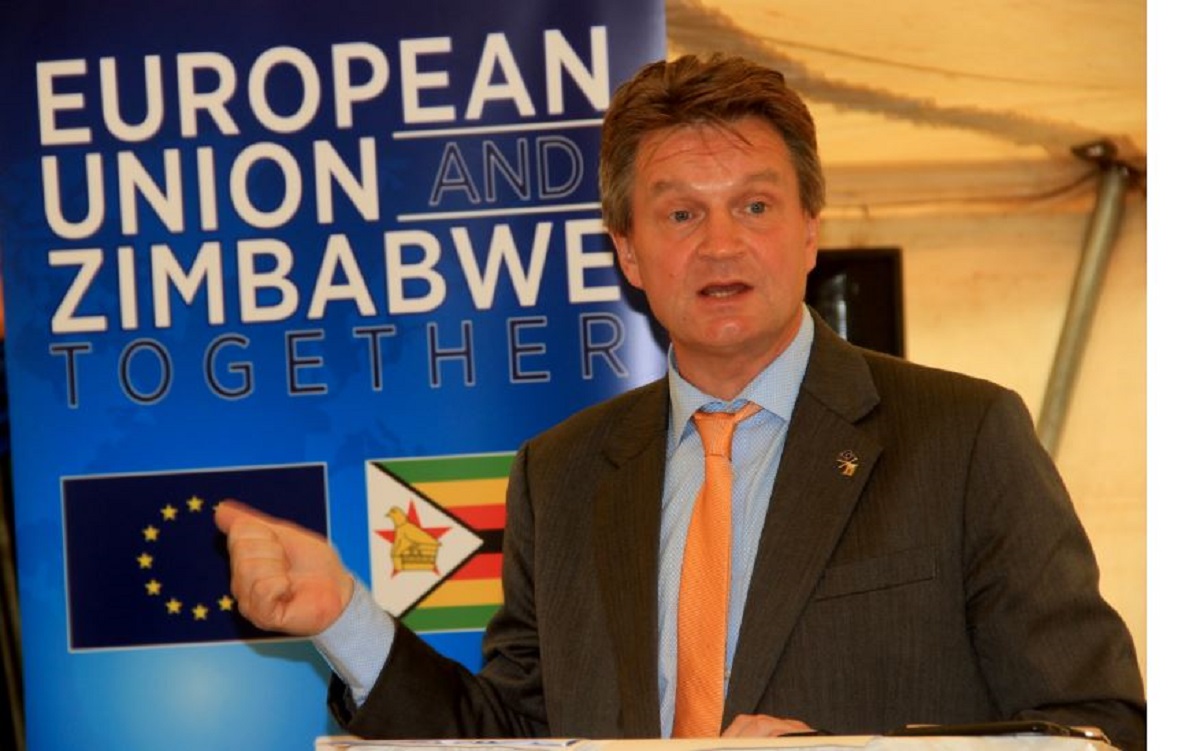
News
Zim has plenty of room to improve on economic, political reforms: outgoing EU ambassador
Published
4 years agoon
By
NewsHawksAFTER serving as the European Union ambassador to Zimbabwe since October 2018 – a year after the 2017 military coup and a few months after the 2018 polls – Timo Olkkonen (TO) is leaving for a new diplomatic posting soon. The NewsHawks’ (NH) news editor Owen Gagare and reporter Mary Mundeya caught up with him to discuss his time in Zimbabwe.
He arrived in Zimbabwe at a time of great optimism that the country was charting a new path in the post-Robert Mugabe era. However, despite progress on some fronts, President Emmerson Mnangagwa’s administration could have done more to fight corruption which is bleeding the economy. Olkkonen also decries the slow pace of key economic and political reforms and says the country’s leadership should accept that bad policies of the past and present administrations are responsible for the economic hardships rather than blaming EU measures which he says are inconsequential. Below are excerpts of the interview:
NH: Thank you, ambassador, for granting us this interview. You have been in Zimbabwe since October 2018. How has your stay been? And what are the lasting memories? What impressions do you have of the country from various perspectives?
TO: Well, yeah, it’s been a good four years. I’ve really enjoyed my time here, so has my family. You asked me about lasting memories. There are so many of them. I’ve had incredible experiences here, personally and professionally. I think Zimbabwe is an extremely beautiful country. And I’ve seen some of the natural beauty it has to offer and I have shared that with my family.
Everybody’s talking about Victoria Falls, but there is Chilojo Cliffs, there is Mana Pools, there is a cultural heritage: Great Zimbabwe, Khami Ruins, the cave paintings. The country is full of cave paintings, you know, you bump into them in many places; the varied landscape, the rivers, the mountains, Eastern Highlands, the Lowveld. It’s a country of astonishing beauty and diversity.
And, of course, just the Zimbabwean people who are extremely friendly and welcoming and hospitable. So, it’s been a great personal experience, professionally, of course, sometimes frustrating, but always interesting. I think Zimbabweans, as a people, are fascinating and extremely resourceful and can also manage very difficult situations, like making the plan, which is almost the national motto. Of course, there are days during work which were not that great, and then some days which were very rewarding. So, it has been a very interesting ride, and I’m sad to see it coming to a close.
NH: From a diplomatic perspective, and when weighing up the successes and failures of the mission, what would you say were the EU’s major points of convergence and the major points of divergence with the Zimbabwean authorities?
TO: I tried to have a more comprehensive approach when we come to the relations, that obviously government is the key point of contact, and where you have to start with and finish with and everything, but then you want to engage with the wider spectrum of society. You would not be a good diplomat if you wouldn’t do that; to talk with the private sector, civil society, you know, these people-to-people contacts.
But if you’re talking really about these institution-to-institution, government-to-government relations, there’s no hiding away from the divergence, the differences of opinion and differences of view that we have on issues such as human rights, the human rights situation, the question of the civic space, the freedom of the civic space and into political rights and their respect and how to tackle past grievances, the reform agenda, where we have, you know, different interpretations as well to an extent the question of restrictive measures.
So clearly there are points where we have differences of view, but then we have also convergences, you know. When I came here to the country, there was this feeling that okay, we have to start talking, we have to start dialoguing. And then we established this formal political dialogue based on the model that the European Union has in other countries based on the Cotonou Agreement.
So, that has been a very important step to start dialoguing in a more structured way of trying to foster mutual understanding, and then also you able to pinpoint, okay, where are the differences and what can be done about those? Of course, it’s the political agenda that always steals the limelight, but there are many things that happen that don’t get that much attention; our development cooperation, which is very substantial in the country, which sometimes gets noticed many times or not.
The economic partnership agreement or free trade agreement granting duty- and quota-free access to the European Union market, and which is now being under negotiation to be expanded to other areas such as services. There is the people exchanges, the scholarships, the Erasmus Mundus programme that is going to give more scholarships, the cultural exchanges. So, there are a lot of things happening.
NH: So broadly speaking, how has the diplomatic re-engagement process between Harare and Brussels progressed so far?
TO: Well, like I said, the political dialogue was something that was very important. And clearly the time was ripe to start such a process, and start having these formal engagements. We had four of those engagements. So, I think that’s a prime function of a diplomat, to talk and discuss and dialogue. So, I think that’s important in its own right. We haven’t been able to resolve everything, you know.
There is never a place where you would see 100% eye-to-eye, you would have differences of opinion. But, of course, we have had a chequered past with Zimbabwe in our relations. It’s positive that the government has taken this approach of engagement and re-engagement. We hope that it means an open door policy, in terms of political context, but also in economic terms as well.
So, of course, the thing that is always addressed is the issue of, “sanctions are restrictive measures, that we still have the arms embargo, and the measures on the Zimbabwe Defence Industries”, which are oftentimes blown out of proportion and characterised as being a cause of many problems. Whereas we don’t agree with this with this line at all, of course, and even the nature of the instrument itself, which for us is a human rights instrument, and so the European legal instrument, not an extra-territorial punishing tool. So, although there are steps taken forward, issues remain.
NH: You talked about the arms embargo and measures on the Zimbabwe Defence Industries (ZDI). The Zimbabwean government insists that EU measures and the US measures are responsible for the economic hardships, or at least play the biggest role. What do you have to say about that? It comes up all the time. They say your measures are causing harm to ordinary people.
TO: Well, like you said, that’s a question that is often posed. I haven’t been shown the evidence how the EU restrictive measures actually harm the country and especially how they would harm normal Zimbabweans, regular Zimbabweans. Especially in its current form, because it’s so limited. It’s an arms embargo, and it’s the ZDI. But even before they were always limited in their scope, they were addressed on individuals.
And they were not sanctioning Zimbabwe directly, but they were basically instructions to European actors of what not to do: don’t export arms to Zimbabwe, do not approve visa applications from these people that were targeted. So, then explaining that these measures would be the cause of the economic problems of Zimbabwe, when at the same time you have substantial mismanagement and corruption as you know – exposed, for example, in the Auditor-General’s reports. Clearly, these things are at completely different proportions, when you look at it.
The level of productivity of the Zimbabwean economy, if you look at the agricultural side, for example, and how it compares in the region, you can’t assign that to the European Union measures. So there are also misinterpretations, some things that are affecting Zimbabwe. For example, the non-access to concessional loans, credits from abroad, is not related to the EU restrictive measures; they are a consequence of Zimbabwe’s default on its loans. The common understanding of the world is that if you don’t repay your loans, then who will give you more money? So, this issue has not been resolved. And that’s still the bottleneck.
NH: From your assessment – and you have been here for quite some time – how big a problem is the failure to deal with corruption in Zimbabwe?
TO: I think it’s a serious issue. It’s one of the things that are plaguing Zimbabwe, like I mentioned, as there’s clear evidence to that in the Auditor-General’s reports. I think the government itself is also saying that this is an issue that needs to be tackled. We were supporting the anti-corruption campaign, here in Zimbabwe, together with the government…
And you have heard from the chair of the of Zacc [Zimbabwe Anti-Corruption Commission] herself, about the magnitude we are talking about. If I remember correctly, it was a billion dollars a year. And then you have similar assessments about illegal flows out of the country, from smuggling; all of these illicit activities, clearly, are a big, big hindrance for the country to move forward. And media such as The NewsHawks from time-to-time expose mismanagement, so you see that we haven’t seen the end of it, unfortunately.
NH: You came to Zimbabwe at a time when there was great optimism, both at home and abroad, following the 2017 military coup, and the 2018 elections. What is your assessment of President Mnangagwa’s administration since 2018?
TO: I think in 2018 indeed, when I came to the country, there was a lot of optimism. And I think there were some important policy documents that were issued, such as the transitional stabilisation strategy, and then the National Development Strategy. I think there were very sound policies there.
Similarly, in His Excellency the President’s speeches, when you look at the inauguration speech, there are these very important elements that will be very, very positive for the country. And there are steps that have been taken in terms of reforms on secondary legislation, in many respects, in terms of child protection, media laws, gender issues, we’ve seen progress. But at the same time, there are these political issues that I mentioned, the human rights issues.
We had, recently, the [EU] electoral observation mission follow-up mission here, that came with remarks, but not many of those recommendations have been put in place. Now, of course, these are not instructions, they are recommendations, but still it’s an agenda that we follow what is happening with electoral reform, the Motlanthe Commission follow-up on their recommendations, and many things that still remain that are not yet there.
And then on the economic sphere, for example, the IMF [International Monetary Fund] staff-monitored programme that was then discontinued. There have been lengthy discussions about, for example, bankable leases for agricultural production. So many of these reforms are still not yet there. So, the pace of reforms, of course we would have hoped, in the interest of Zimbabweans, that they would have been in many respects faster.
NH: How has the Mnangagwa administration fared in your view, in terms of breaking from the past policies of former president Robert Mugabe?
TO: Well, of course I don’t have the experience of how Zimbabwe was before or during those times, so the only things that I know is from literature. But you do see many of those same things, in terms of, for example, how to tackle corruption that used to be there, that still is there.
There are processes going on, for example, under the auspices of the National Peace and Reconciliation Commission on how to tackle some of the issues of the past. But I think there is still the recognition that what brought the problems in Zimbabwe was not because of what the previous administration would have done in terms of economic and political mismanagement, that that was not the reason, but, you know, it’s sometimes blamed on sanctions. I think that’s not something that we would agree with. We do see that the previous administration created many of those problems that are plaguing Zimbabwe today. And maybe a more explicit recognition of that would be helpful.
NH: As a historian by training and as a diplomat by profession, what do you think can be done to solve Zimbabwe’s multi-faceted economic and political problems?
TO: Well, I think every context is different, so when I’m reading histories of European countries and other countries, there’s never a model that you could copy, or replicate that works somewhere else and then you could use this for Zimbabwe. But certainly, there are some lessons that could be learned, you know, from other experiences in countries that have gone through the transition, like the former Eastern bloc, within the EU, that are now thriving economies.
The economic trajectory has been very good in many of those countries. And I think what has happened in those countries and some other countries is really to tackle bold reforms in a sense that if you reform, it will hurt somebody’s interests. It’s difficult to do reforms without making real structural changes. And because of the complexity of the Zimbabwean history, there are many constraints on how to tackle some of these big reforms. I think there will be some clear bottlenecks.
The security of tenure, for example, is a key issue, in my opinion, together with transparency. Another thing that’s linked to transparency is a level playing field for economic operators. I would love to see more European companies in the country. But what you hear from the companies is that it’s like they don’t know how to operate, because the rules are not clear. And the predictability is not there. So, I think creating these kinds of environments that create safety, transparency, security and predictability are key. Exactly how to do that, you know, it would be quite arrogant of me to say. There should be Zimbabwean solutions to Zimbabwean problems.
NH: The European Union in its final election observer mission report to Zimbabwe’s 2018 polls said that if electoral reforms remain unaddressed, the 2023 general elections may not be inclusive, transparent or peaceful. In your view, have enough reforms taken place to ensure credible polls next year?
TO: For me, it’s easy to answer that from a point of view that I can bank on real experts on this issue. Like we had in 2018, the EU electoral observation mission here that made these recommendations, 23 of them – and like said it’s not instructions, it’s recommendations because we do recognise that Zimbabwe is an independent country and can take the make its own decisions. Now, the electoral follow-up mission that we had, that came in May this year to follow up on those recommendations, then came to the conclusion that there has been progress in two of the recommendations, but not in the rest.
This is quite a critical observation. But there was also then the recognition that, yes, many of these recommendations are contingent on a new, or an amended Electoral Act, that could, you know, look at this. So, there’s still time, I think, to put reforms in place, which could make a difference as the country moves towards 2023. I’ve been talking about the electoral observation mission from the EU, but there were other international ones, and then also domestic ones, I think there’s a big convergence in the observations. And I think Zimbabwe still has the possibility and the opportunity of addressing those. And I think, all of us – individuals, institutions, and countries – should learn from the past, so why not take advantage of learning from the previous experience?
NH: The EU and other partners through the United Nations Development Programme (UNDP) has been funding the Zimbabwe Electoral Commission (Zec) capacity building project which has a long-term vision of developing institutional, organisational and electoral capacity of the commission. We understand that the first phase ended in April. In your view, has this programme been a success and will you fund a second phase?
TO: We are very keen on supporting the electoral agenda in Zimbabwe. Of course Zec is a key actor in that electoral agenda. I can’t give any details, because it’s still unfinished business. But clearly, governance is one of the priority areas where we are going to be cooperating with Zimbabwe in the future. Then in terms of democratic processes, elections are a key part of that. And so, yes, we are looking at support for electoral processes. On the project itself, I think the jury is still out.
But there are still some notable achievements from that project. One was the introduction of the biometric voters’ roll for 2018. That’s on the basis of exactly that cooperation, which still we’ve heard about this criticism about the voters’ roll and its incarnations now lately, but then, yet again, it was an important step forward into Zimbabwe and its electoral landscape, an important improvement. So, clearly, there have been steps taken forward. But indeed, I think the evaluation of the of the project is still not there.
NH: There are reports that the UNDP, using funds from the EU and other partners, acquired servers and other electrical equipment ahead of the 2018 polls, but both the EU and UNDP were shut out after delivering. Can you confirm funding the servers and tell us what happened thereafter?
TO: Well, that happened while I was not yet here, so that was before my time. But my understanding was that there are some discussions about various servers, one for the results and one for the voters’ roll. I can tell you that we were funding, via the UNDP, the one on the voters’ roll, whereas the results management then was an additional separate issue. So, I really, really don’t know what to say.
But I think there’s sometimes in these discussions a bit of a confusion about what the EU actually funded through the UNDP. And there was then this discussion about the results management and the server that was handling those. But, indeed, a server was financed, but it was more for the voters’ roll.
NH: You’ve advised the Zimbabwean government not to rush through the Private Voluntary Organisations (PVO) Bill before conducting wider consultations with stakeholders. What are your comments over the Bill?
TO: Our misgivings are based to a larger extent on the criticism from the Zimbabwean civil society community and we’ve seen some quite critical analytical takes on it, challenging its constitutionality, how it’s affecting freedom of assembly, that its language is too generic in the way that it leaves too much room for interpretation. And it gives quite a lot of power to the Executive and the avenues of recourse are not clear so there are some examples that I’ve understood from the critique on the PVO Bill.
So, this in itself will raise questions that why is there a need to rush, and we heard that then there was this second amended version of the Bill, that, in our understanding has not been consulted with the public voluntary organisations that are the ones that have to then comply with the Bill. And I think it would be good practice to do that.
Of course we recognise that, again, Zimbabwe as an independent country that has its own legislature which is at liberty to design the laws that it wishes. But, you know, the question is that with all these criticisms around that, wouldn’t it be better to take the time [to address the concerns]? There’s one thing that was in the earlier stages of the Bill that was used to address the Financial Action Task Force recommendations.
And we know that since the Financial Action Task Force has actually delisted Zimbabwe, so that argument is not there. And it was a very prominent argument half a year ago. So, then the question is, what is our right, why do we comment on this kind of issue? But for us, it’s not a state-centred approach; civil society is an important actor, in any country, at least in any democratic country. And for us it’s an important development partner, a partner for advocacy in its own right, watchdog for governments, be they in Europe or in Africa.
NH: Enforced disappearances have been a major human rights concern over the years. In your view, are the authorities seriously tackling this issue in Zimbabwe?
TO: This is a discussion that we have had, we have raised our concerns during the political dialogue about the cases and we’ve heard the explanations that these are either not real cases or that they are ordinary criminal cases that are not political cases. Okay, I wouldn’t be able to go into the merit of each individual case.
It’s also not my job. But it is to be recognised that Zimbabwe has a history with these kind of cases. And Zimbabwe has not ratified the International Human Rights Instrument on Enforced Disappearances. So, I think that is a reason why we are paying attention to these issues as part of the wider human rights agenda. So, it is a topic that we hope we don’t need to discuss in the future, but if so, we are ready to do that.
NH: The Zimbabwean government owes the European Investment Bank (EIB) more than US$300 million and the failure to clear this long-standing debt has made it difficult for the country to access fresh funding. How is this issue being resolved?
TO: Well, this is linked to the overall debt situation. Indeed, the external debt that Zimbabwe owes to foreign countries and institutions is very significant. And the European Investment Bank is one of those creditors to whom Zimbabwe owes money and has defaulted on its debt. The European Investment Bank is defined as a multilateral bank, in the same way as the African Development Bank, and the World Bank. And for the EIB, it is very important that they are treated on an equal basis.
So basically, any approach of how to address this debt issue should be a comprehensive one that takes into account all these multilateral financing institutions. And that’s why we were very interested in the staff-monitored programme of the IMF. Of course, we’ve heard from the government that they have interest in discussing and looking at this issue, and I think the doors are open to do that.
But so far, we haven’t seen a comprehensive approach that would address the wider agenda. That said, the European Investment Bank is back in town, they have opened the credit facilities, through private banks, three private banks, to the tune of around 40 million euro, which is giving hard currency loans to Zimbabwean private sector operators.
And that’s something that we could do because, even with the situation – which means not with public institutions but with the private ones – it shows our commitment and interest in working with Zimbabwe.
You may like



